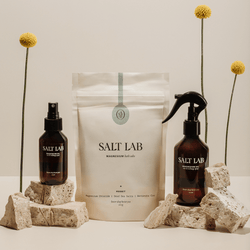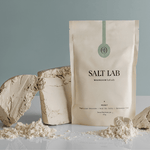When you think of magnesium, what comes to mind? Maybe its role in muscle recovery, helping you sleep better, or easing those tension headaches. But did you know that magnesium also plays a crucial role in maintaining gut health? This often-overlooked mineral can have a profound impact on your digestive system, supporting everything from enzyme balance to easing discomfort. Let’s dive into how magnesium can be your gut’s best friend.
Balancing Digestive Enzymes
Digestive enzymes are essential for breaking down the food we eat, ensuring that our bodies absorb the nutrients we need. Magnesium is like a backstage manager, helping these enzymes perform at their best. It acts as a cofactor, meaning it’s a helper molecule that enables enzymes to carry out their functions effectively.
There are specific enzymes in your gut, such as amylase, which breaks down carbohydrates, and lipase, which helps digest fats. Magnesium ensures these enzymes work properly, breaking down food into smaller components that your body can easily absorb. Without adequate magnesium, this process can become inefficient, leading to indigestion, bloating, and nutrient deficiencies.
Maintaining the right balance of digestive enzymes is crucial for optimal gut health. Magnesium helps keep this balance in check, ensuring your digestive system runs smoothly and efficiently.
Supporting Gut Health
Beyond its role in enzyme activity, magnesium is also vital for the overall health of your gut. One of the ways it does this is by maintaining the balance of good bacteria in your gut microbiome. This microbiome is a bustling community of trillions of bacteria, fungi, and other microbes that play a crucial role in digestion, immune function, and even mood regulation.
Magnesium has been shown to support the growth of beneficial bacteria in the gut. These good bacteria are essential for breaking down complex carbohydrates, producing vitamins like B12 and K, and protecting against harmful pathogens. By fostering a healthy microbiome, magnesium helps create an environment where these beneficial bacteria can thrive.
Moreover, magnesium helps regulate the production of stomach acid. While too much acid can lead to discomfort and issues like acid reflux, too little can hinder digestion and the absorption of nutrients. Magnesium helps strike the right balance, ensuring your digestive system functions effectively.
Easing Digestive Discomfort
Digestive discomfort, whether it’s bloating, constipation, or cramping, can be a real pain—literally. Magnesium can be a natural remedy for these common issues, providing much-needed relief.
One of the most well-known benefits of magnesium is its ability to alleviate constipation. Magnesium acts as an osmotic laxative, meaning it draws water into the intestines, making stools softer and easier to pass. This can be particularly helpful if you’re dealing with occasional constipation or if your digestive system needs a little extra support.
But magnesium’s role in easing digestive discomfort doesn’t stop there. It also helps relax the muscles in your gastrointestinal tract, which can ease cramping and allow for smoother digestion. If you’ve ever experienced that uncomfortable feeling of your stomach being in knots, magnesium might just be the relief you need.
Magnesium’s muscle-relaxing properties also extend to the lower esophageal sphincter, a muscle that controls the passage between the esophagus and stomach. By relaxing this muscle, magnesium can help reduce the symptoms of acid reflux and heartburn.
Addressing Stress-Related Gut Issues
Stress and gut health are closely linked. When you’re stressed, your body goes into fight-or-flight mode, which can slow down digestion and lead to symptoms like bloating, nausea, and even changes in bowel habits. Chronic stress can also negatively impact the gut microbiome, leading to an imbalance of good and bad bacteria.
Magnesium is known for its calming effects on the nervous system, which can help mitigate the impact of stress on your digestive system. By promoting relaxation and reducing stress hormones like cortisol, magnesium helps create a more balanced environment in your gut. This, in turn, can help alleviate stress-related digestive issues, making magnesium a valuable tool for those dealing with stress-induced gut discomfort.
Boosting Nutrient Absorption
Good gut health isn’t just about avoiding discomfort; it’s also about making sure your body is absorbing the nutrients it needs to function at its best. Magnesium plays a key role in this process, especially when it comes to the absorption of other essential nutrients like calcium, potassium, and vitamin D.
Magnesium helps maintain the integrity of the intestinal lining, which is crucial for nutrient absorption. A healthy gut lining acts as a barrier, allowing nutrients to pass into the bloodstream while keeping harmful substances out. When this barrier is compromised, it can lead to a condition known as leaky gut, where toxins and undigested food particles leak into the bloodstream, triggering inflammation and other health issues.
By supporting the health of the gut lining, magnesium helps ensure that your digestive system can efficiently absorb the nutrients from the food you eat. This not only supports overall health but also helps prevent nutrient deficiencies that can lead to a range of health problems.
Choosing the Right Form of Magnesium
Not all magnesium supplements are created equal, and when it comes to gut health, choosing the right form is crucial. Some forms of magnesium, such as magnesium oxide, are poorly absorbed and can actually cause digestive discomfort like diarrhoea.
Magnesium chloride, found in topical magnesium products like sprays and bath salts, is also well-absorbed and can be a good option if you’re looking to support your magnesium levels without taking oral supplements. Applying magnesium topically can help bypass the digestive system altogether, making it a suitable option for those with sensitive stomachs.
When choosing a magnesium supplement, it’s important to consider your individual needs and any existing digestive issues. Consulting with a healthcare professional can help you find the right form and dosage for your specific situation.
Incorporating Magnesium into Your Diet
While supplements can be helpful, getting magnesium from your diet is always a great option. Foods rich in magnesium include leafy green vegetables, nuts, seeds, whole grains, and legumes. By incorporating these foods into your diet, you can support your gut health naturally while also reaping the other benefits of magnesium.
Adding magnesium-rich foods to your diet is not only beneficial for your gut but also for your overall health. These foods are packed with other essential nutrients like fibre, antioxidants, and healthy fats, which can further support digestion and overall wellness.
Magnesium is a true multitasker when it comes to gut health. From balancing digestive enzymes and supporting a healthy microbiome to easing digestive discomfort and boosting nutrient absorption, this essential mineral plays a key role in keeping your digestive system running smoothly. Whether you’re dealing with occasional bloating, stress-related gut issues, or simply want to support your overall digestive health, magnesium could be the missing piece of the puzzle. Remember to choose the right form of magnesium, consider incorporating magnesium-rich foods into your diet, and consult with a healthcare professional if you have specific health concerns. By giving your gut the magnesium it needs, you’re taking a big step toward better digestive health and overall well-being.
















